1200 Interview with Marion Quednau
INTERVIEW: Marion Quednau with The Ormsby Review
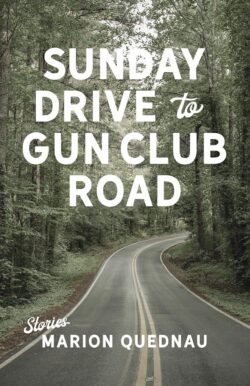 Marion Quednau has won numerous awards for both her fiction and her poetry, including a National Magazine Award, and the People’s Choice Award when shortlisted for the CBC Poetry Prize. Her fiction has received critical acclaim, the SmithBooks/Books in Canada First Novel Award, when the late Mordecai Richler judged the writing in The Butterfly Chair to be “imaginative and informed by intelligence.” Quednau’s short fiction has appeared in a variety of literary magazines and has won kudos in competition. The title story in Sunday Drive to Gun Club Road (Nightwood Editions, 2021) was shortlisted for the Carter V Cooper Award in 2019 and appeared in the CVC9 Anthology in 2020. Quednau lives on the Sunshine Coast.
Marion Quednau has won numerous awards for both her fiction and her poetry, including a National Magazine Award, and the People’s Choice Award when shortlisted for the CBC Poetry Prize. Her fiction has received critical acclaim, the SmithBooks/Books in Canada First Novel Award, when the late Mordecai Richler judged the writing in The Butterfly Chair to be “imaginative and informed by intelligence.” Quednau’s short fiction has appeared in a variety of literary magazines and has won kudos in competition. The title story in Sunday Drive to Gun Club Road (Nightwood Editions, 2021) was shortlisted for the Carter V Cooper Award in 2019 and appeared in the CVC9 Anthology in 2020. Quednau lives on the Sunshine Coast.
In her debut short story collection, Sunday Drive to Gun Club Road, Quednau offers unsettling examinations of “what really happened” with rich, complex characters that might equally arouse our suspicions or sympathy: we pay attention. She gives voice to the interludes between actions, what almost occurred, or might yet, in the skewed time “before” or the acute reckoning of “afterward.” In Quednau’s stories, timing is everything, the rusted twentieth-century myths of ownership or conquest are set against the incoming reality of pandemic, our separate notions of love or of courage, of painful transformation, yet to be believed.
*
The Ormsby Review: Is the cover of your new collection Sunday Drive to Gun Club Road taking in the beloved winding roads of the Sunshine Coast?
Marion Quednau: I don’t know anything about the locale of the cover photo, and in a sense don’t want to know. That way it’s more representative somehow, if it’s not nailed down to this or that curve in our sketchy two-lane highway on the Sunshine Coast, and is perhaps a rise in a road near Bonner’s Ferry, Idaho. A friend who was a locations scout in the film industry used to say, when finding a perfect place for the shoot, even if the story was set on the Atlantic and he was on the Pacific: “This could be anywhere!” And in fact, the title story could be anywhere in BC (the teenage protagonist mentions the family driving “south of the line” once, to Snohomish, Washington).
The Ormsby Review: Your novel The Butterfly Chair won the W.H. Smith/Books in Canada First Novel Award. What was that experience like for you and what do you remember most from the victory?
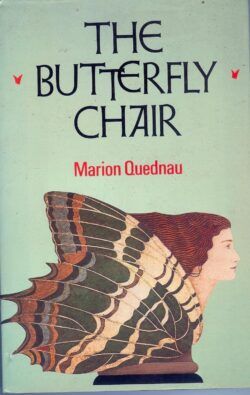
Marion Quednau: I was shocked silly, thinking it a prank call when someone announced “You won!” I may not have known I was even in contention: I don’t think they published short lists then. I had gone solo in writing that book, hadn’t emerged from any school of writing, so it was wonderful to be recognized as having something meaningful to say, my prize connecting me with a slew of readers—and a sudden community of Canadian writers. One of those new colleagues was Janice Kulyk Keefer, a super-accomplished writer across genres whose vote was the tiebreaker on the jury. I still thank her, in quiet ocean side mantras, for having favoured my novel. The judges had to give written comments re their choices in Books in Canada, Mordecai Richler calling my writing “sinewy and precise.” So I got a picture of myself wobbling on a balance beam, having to keep a lot of balls in the air, and at least not falling flat on my face. I was then, and am still, a great admirer of his writing, e.g. Barney’s Version, with its use of footnotes in telling disparate “truths,” being a brilliant invention.
The Ormsby Review: What came first, the poet or the novelist? Can you talk about different and similar approaches to both forms of writing?
Marion Quednau: I wrote dark poems as a teen, but a lot of folks do that in their youthful angst. I did have a very supportive English teacher in high school who pressed me to enter a writing shtick at York University, performing to my then-biggest audience in black leggings and mini-skirt, no less. (A not-trending fashion moment of “wannabe beatnik meets academia,” everyone else in preppy oxford cloth shirts and tweedy jackets.) But that teacher, Bud Allison, was formative in giving me the notion I had something to say that might matter; I otherwise received a slew of detentions that tried to convince me to keep quiet. So poetry came first, but publishing came with my first novel, described as having “poetic language.” I guess that means a unique or startling way of naming or placing things, a spareness and tension in the language.
The Ormsby Review: The opening story ‘Snow Man’ deals with neighbour politics. If it were a movie, the tagline might be something like Because Maybe Your Neighbour Is A Damn Liar.
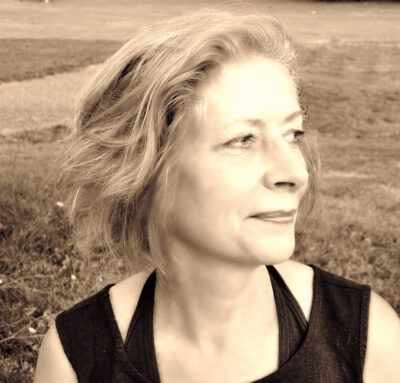
Marion Quednau: My ‘Snow Man’ story is about how “judgy” we can be if someone doesn’t fit our expectations of how they should appear or act. (New Brunswick pals of mine use that term, and I like its playful sound better than “judgmental”.) In this story, the characters are essentially kind people observing the new oddball neighbour — they take him food and invite him over to their Christmas shindig — but they haven’t factored in grief when they assess his peculiar actions of raking a snowy lawn. So, they’re forced to grow a little when the truth comes out.
The Ormsby Review: The title story involves itself with the nostalgic Sunday drive. Perhaps each generation has a version of this ritual. Your description of the narrator recalling the food her mother packed made me twitch with horror and delight. Do you think COVID-19 has brought a forced return to some of these once seemingly inconsequential past times? What’s next? Candle-making, board game marathons and fishing trips? Are we returning to the life paintings of Norman Rockwell?
Marion Quednau: Yes, the ritual of the Sunday drive does harken back to a post-war, mid-twentieth-century era, with less traffic on the roads, less TV, and more obligatory “nuclear family” time. Stores weren’t even open on Sundays in Toronto in the sixties, as a nod to congregating at church. And there were few fast-food outlets, so you had to make do with your mother’s picnic offerings (fatty deli meats and too much mayo.) But there was a gratitude still, for long stretches of countryside, for a car and its gas-guzzling freedoms, that dreamy state you entered when driving through new scenery apart from your modest home patched together on the outskirts of a city, half-suburb and half-rural, which was where I roamed as a child.
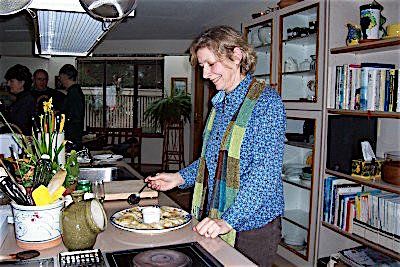
The family in my story is definitely a holdover from the past when going on these jaunts in the nineteen-nineties, restless and looking for what I call “roadside redemption.” While writing the story I asked a dinner party of friends what they thought about the ordeal of being stuck in a car for hours with dear old dad at the wheel and being told to appreciate this or that, and few knew what I was talking about, except having read about it in books. So maybe it was more of an eastern Canadian thing, coming from European roots of leaving the denser cities and having a picnic near a patch of water or woods.
The Ormsby Review: Short stories have been often maligned as a less cool sibling of the novel, but I don’t really buy that. I think its just weird editorial shifts in picking on literary genre, as if the world is now tired of making fun of poetry, so let’s pick on … drama no … graphic novels … how about short stories. I think short stories are incredible universes unto their own. Brokeback Mountain, a fantastic film, is based on a short story by Annie Proulx published in the New Yorker in late 1997. Your thoughts on the short story?
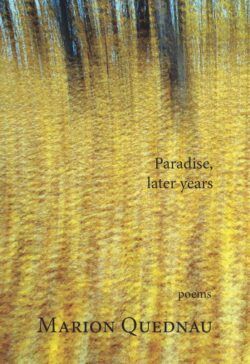
Marion Quednau: Yeah, it’s odd, when you think that short stories were once the way writers made a living, by publishing these quirky little entireties in magazines that paid well, as some of the American publications did, e.g. The New Yorker, The Atlantic, Harper’s or Esquire. You could earn 5 to 10 grand a pop in the fifties — that’s a bundle in today’s terms. Outlets for fiction were scarce in Canada, Saturday Night one of the few general circulation magazines to give writers that boost when Robert Fulford was editor. And now it’s The Walrus, excepting the literary mags, which can’t afford to pay much. So maybe short stories were given more value by readers when given more airtime.
I really like the pressure of a short story having to end; there’s an impetus right from the get-go of having to create character and voice and atmosphere in only a few telling brushstrokes and then inventing some small or large commotion requiring a shift in dynamic, a break or reforming of character.
The Ormsby Review: What is your best advice for a writer who is having trouble finding the right ending?
Marion Quednau: My advice regarding the endings of short stories? Create an event that forces change in a major character — some small or greater upheaval.
Actors like to ask themselves “What’s at stake? What can be lost or gained?” I think that works equally well for writers. A character grounded in a strong voice, complex enough to have us onside and still be “wrong” in some sense, pretty well compels a strong ending. Which is not to say the outcome should be expected: the comeuppance for a mistake made in the early pages of the story can appear in surprising ways, catch both the readers and the characters off guard, as they often do in so-called “real life.” Someone has to pay the piper and it’s not always the character that caused all the stir — others often pay for our flawed choices.
A pivotal short story in this regard is Colum McCann’s Everything in this Country Must, told in the voice of a young girl caught in the crossfire of the Irish troubles, with beautiful sensory detail adding to the atmosphere of waiting for something bad to happen — or maybe, just this once, something good. There are flinty bits of dialogue thrown back and forth in an unlikely brief intersection of those opposing sides, and the ending is a shocker. It reveals so purely the price paid by innocence and hope in times of war. As you mentioned with Annie Proulx’s Brokeback Mountain, McCann’s story also evolved into a film nominated for an Oscar.
*
The Ormsby Review. More Books. More Reviews. More Often.
Publisher and Editor: Richard Mackie
The Ormsby Review is a journal service for in-depth coverage of B.C. books and authors. The Advisory Board consists of Jean Barman, Wade Davis, Robin Fisher, Cole Harris, Hugh Johnston, Kathy Mezei, Patricia Roy, Maria Tippett, and Graeme Wynn. Scholarly Patron: SFU Graduate Liberal Studies. Honorary Patron: Yosef Wosk. Provincial Government Patron since September 2018: Creative BC
“Only connect.” – E.M. Forster
3 comments on “1200 Interview with Marion Quednau”
What a great interview! Every story in this book is fabulous.
Lovely to read about Marion’s writings. Her style is as natural as a wave on the ocean and a conversation while out having coffee.